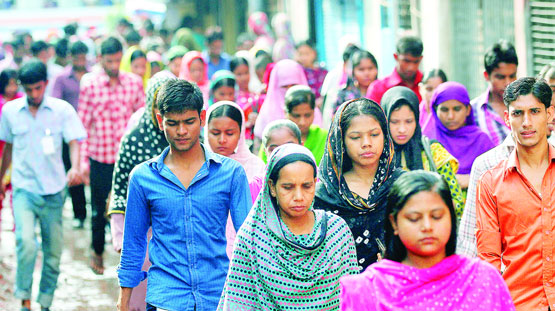Bangladesh faces 30pc lacking of labour skills
Staff Correspondent: The country’s labor market has a huge skills gap between demand and supply, which stands at 30 percent lacking. However, this number is different depending on the sector. But compared to that there is no training system. In some cases, training is not up to standard or meets current needs. This gap is more especially in middle and higher-level jobs. As a result, a lot of foreign exchange from this country is going behind the foreign workers in the garment industry. Therefore, there is no alternative to improving the quality of education and training.
At the same time, the working capacity of the workers should be increased. In the next 10 years, there will be massive employment demand in 5 new sectors of the country. Jute, furniture and pharmaceuticals sectors are among them.
Bangladesh Institute of Development Research (BIDS) SC research has revealed these facts. The research report titled ‘Labor Market Studies for SEIP on Skill Demand, Supply and Mismatch’ has been released on Sunday (August 28).Planning Minister MA Mannan was the chief guest at the event organized at a local hotel of the capital.
Director General of BIDS Dr. Vinayak Sen was the special guest of the event as a member of Planning Commission. Mohammad Emdad Ullah Mian and National Skill Development Authority (NSDA) Executive Chairman Nasreen Afroz attended as special guest. As a negotiator, Dhaka University Professor Dr. Saima Haque Bidisha, Executive Project Director Ikhlasur Rahman, Walton Hitech Industries Chief Innovation Officer Tapas Kumar Majumder,Uzma Chowdhury, Director of Corporate Finance of PRAN-RFL and Anir Chowdhury, Policy Advisor of UNDP. BIDS Senior Research Fellow Dr. Kazi Iqbalpresented the main article in the event. Dr. Iqbal in the original articlesaid that there is a mismatch in the labor market, the required number of skilled workers are not available.
This shortage is especially high among managers and professionals. There is a severe shortage of highly skilled people in agro processing, readymade garment industry and light engineering industry.
Again, if there is a need for 8th class pass workers, applications are coming from Masters side. And where science students are needed, they are not available. In some cases, there is an under-quality gap of 71 percent. Again, there is vertical mismatch (unqualification of job candidates) at 83 percent. However, skill shortages are less common among lower-level workers. The higher one goes, the greater the skill gap.
He also said that the performance among the workers in this country is low. In this case, Singapore is at the top position and Bangladesh is fourth from the bottom. That is, Cambodia, Vietnam and Pakistan are after Bangladesh. Besides, many countries including India, Sri Lanka, Mongolia are positioned above Bangladesh. 3.6 percent of workers received institutional training in the last 1 year.
Director General of BIDS Dr. Vinayak Sen said that a fair wage in the labor market increases the desire for training. Training should be matched with wages in the labor market. Measures need to be taken from now according to the demand of workers in the next 10 years. Besides, foreign workers should be sent more efficiently. If not, the country will lag behind in sustainable development with unskilled workers.
Speakers said that unskilled workers in industrial factories are reducing productivity, as well as they are not able to adapt to the development of technology. As a result, one is likely to fall into a low productivity trap similar to the middle-income trap. To solve these problems, the education system should be reformed. Awareness should be raised so that vocational education is not socially marginalized. Comprehensive information should be provided among the students about what kind of workers are in demand in any sector or new demand will be created in the future.
In this regard, Planning Minister MA Mannan said, ‘I think development is important before good governance. Because a large section of the country’s marginalized population wants two meals a day, clean water and fair justice. They are happy if they have them. For this, development must be done first. Besides, it is necessary to ensure good governance.
President Joe Biden tests positive for COVID-19 while campaigning in Las Vegas, has ‘mild symptoms’
International Desk: President Joe Biden tested positive for COVID-19 while traveling Wedne…








